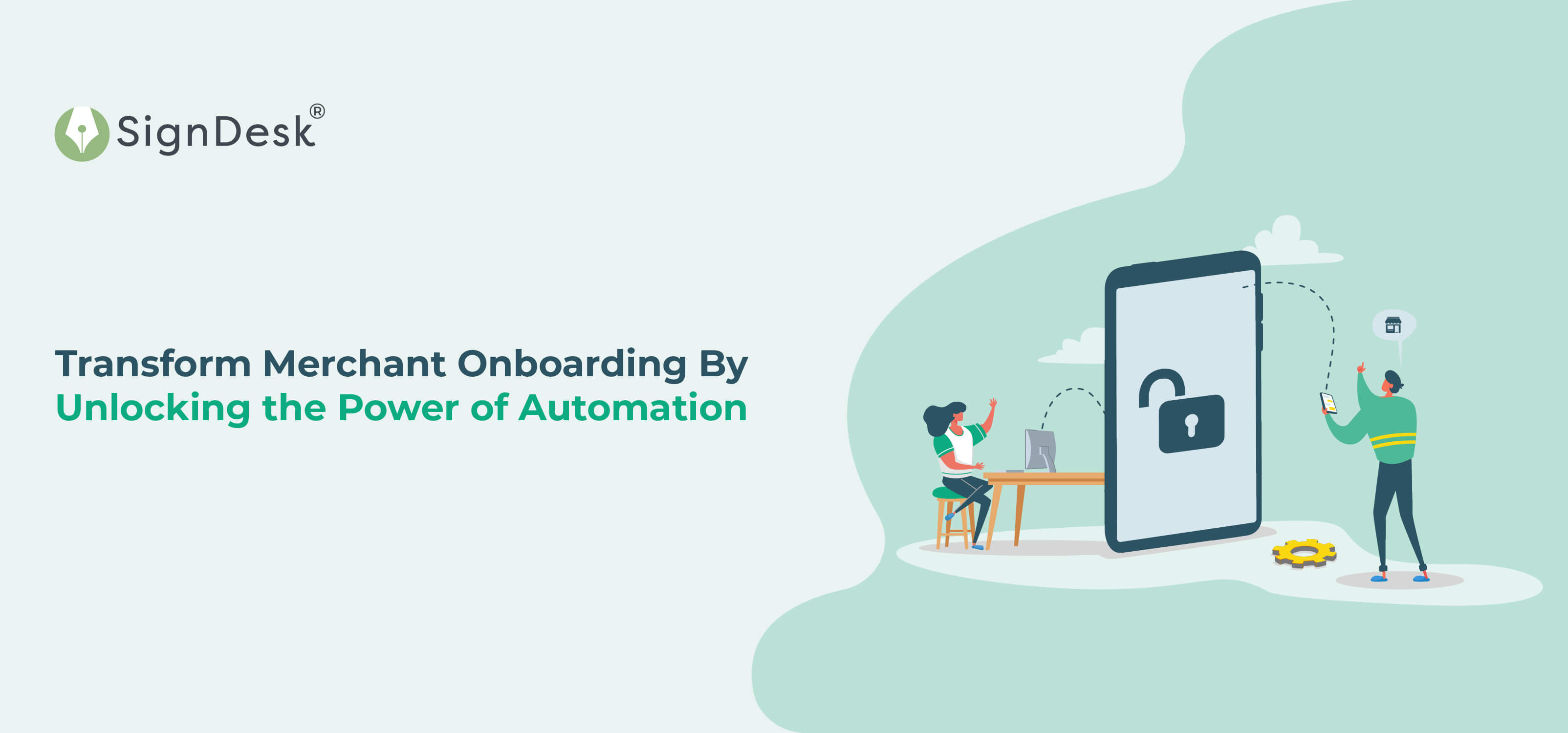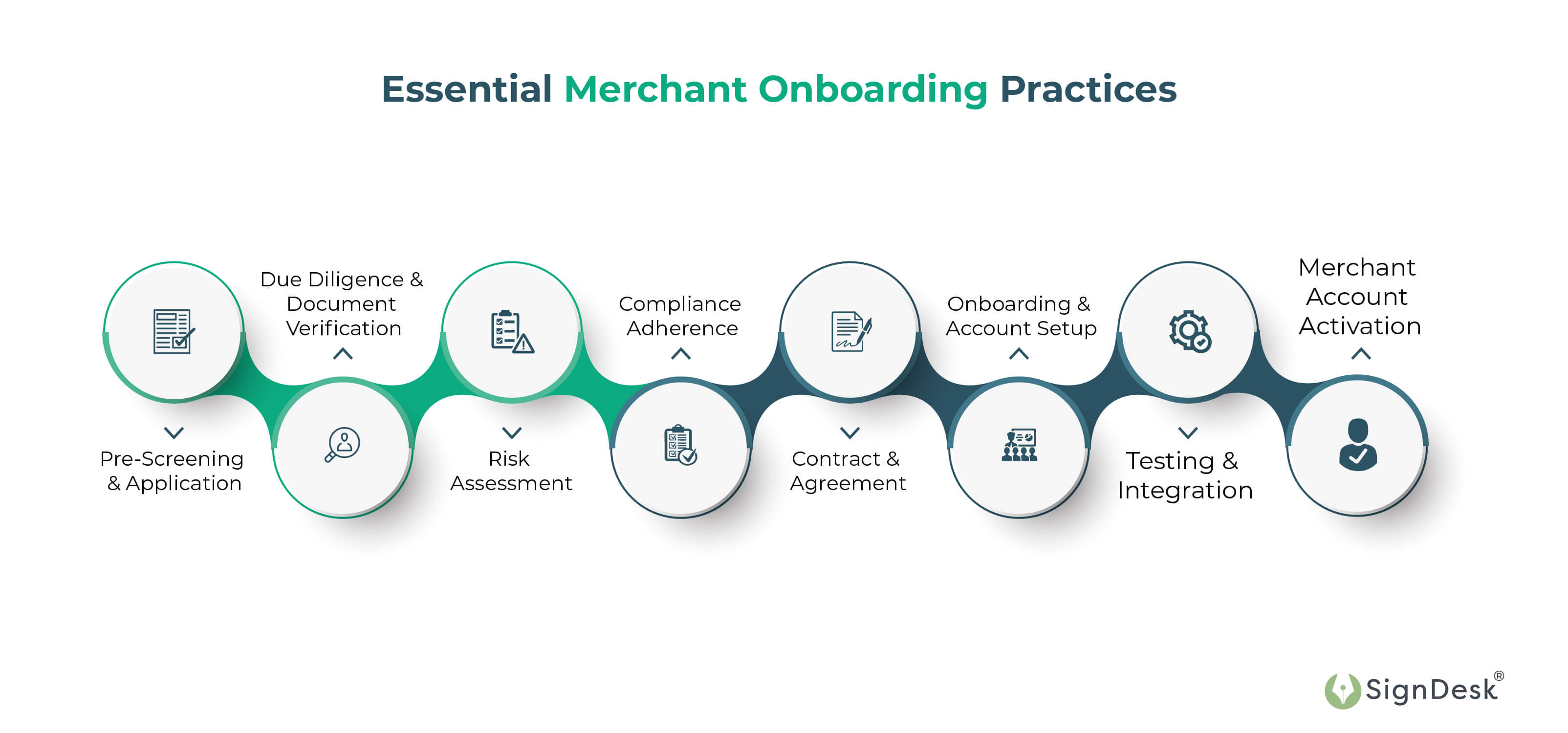Introduction
In the dynamic and constantly evolving commerce landscape, businesses encounter numerous obstacles and possibilities to meet their customers’ needs. One area that frequently presents challenges is merchant onboarding.

Manual merchant onboarding procedures take considerable time and are often prone to eros leading to delays and dissatisfied customers. Thanks to technology, intelligent merchant onboarding has completely changed this essential facet of corporate operations.
What is Merchant Onboarding?
Merchant onboarding is the process through which businesses establish working relationships with new merchants and bring them on board as official participants in a company’s commerce or payment ecosystem.
The merchant onboarding process facilitates transactions and interaction between merchants and businesses through a set of procedures to verify and onboard merchants. The standard procedures involved in merchant onboarding include collecting relevant information of the merchants, validating business identities, assessing risks, and setting up the merchant accounts.
When businesses register with payment processors or payment service providers (PSPs), they must go through the merchant onboarding process. Tasks such as application submission, document collecting, underwriting, compliance checks, and account activation are implemented to carry out these procedures.
PSPs must gather adequate data about potential new merchants to carry out a comprehensive risk assessment in order to ensure a seamless and legally compliant merchant onboarding process. Businesses operating in sectors with a significant chance of fraud are referred to as high-risk’. Some examples would be merchants operating in online marketplaces and auction platforms, cryptocurrency exchanges, forex, online gambling websites, etc.
Software for onboarding new merchants is a powerful solution that streamlines and automates the process. From application submission to account activation, the onboarding process is streamlined, enabling businesses to grow their clientele, boost sales, and improve customer satisfaction.
Merchant onboarding software solutions like SignDesk aim to make the process more efficient by automating and simplifying the process from end to end, ensuring legal compliance, and offering merchants a seamless experience as they integrate into the company’s network.
Investing in effective onboarding practices provides a competitive edge in today’s fast-paced business landscape. It paves the way for mutually beneficial partnerships and empowers firms to thrive in an increasingly competitive and fast-paced business environment.
Essential Merchant Onboarding Practices
Implementing effective merchant onboarding procedures with streamlined processes enables businesses to provide a quick and seamless experience that reduces friction, improves compliance, and ensures smooth onboarding journeys.
Businesses wishing to build lasting relationships with new merchants and optimize their operations must use the following effective merchant onboarding practices:

- Pre-Screening & Application: Businesses must create a simple application process to collect necessary details from prospective merchants to onboard them. Merchants must be able to provide basic information about their business, contact information and submit supporting documentation online to initiate the onboarding process. Initially, the pre-screening procedure is carried out when the PSP is learning more about the new merchant. The company could conduct a brief check after receiving a merchant application to ensure everything is lawful to screen obvious fraudsters and scammers.
- Due Diligence & Document Verification: Automating the collection and verification of necessary documents, such as identity documents, business licenses, and financial statements, helps companies save time and improve efficiency when onboarding merchants. Verifying business permits, running background checks, and establishing the identities of key stakeholders are carried out to confirm the integrity and authenticity of the merchant’s operation.
- Risk Assessment: Next, firms need to analyze possible risks related to bringing the merchant on board. This entails evaluating creditworthiness, financial stability, industry reputation, and regulatory compliance through robust risk assessment procedures. After assessing the merchant, they are categorized as either low-risk or high-risk. If necessary, underwriting is conducted to evaluate the risk and choose the best terms and conditions for the merchant’s account.
- Compliance Adherence: Businesses must ensure adherence to pertinent legal requirements, such as Know Your Business (KYB) and anti-money laundering (AML) laws. They must implement procedures to check the identities of merchants and keep an eye out for unusual or suspicious activities. By implementing these practices, organizations can decrease the chance of doing business with merchants involved in corrupt or illegal activity, safeguard their reputation, and adhere to regulatory requirements.
- Contract & Agreement: After due diligence and risk analysis processes are completed, a contract or agreement such as a Master Service Agreement, is made and signed by all parties. The contract sets forth the terms and conditions of the merchant’s partnership with the company, including the costs, obligations, and services.
- Onboarding & Account Setup: Next, the merchant gets on board with the business. The merchant’s account is created on the platform or system of the company. Setting up payment processing options, integrating them with relevant systems, and creating identifying credentials for the merchant are all the necessary steps in this process.
- Testing & Integration: Companies must conduct the necessary testing to ensure seamless connection and functionality between the merchant’s systems and the company’s infrastructure. This could involve API integrations, connectivity tests, etc.
- Account Activation: The merchant’s account will be activated once all requirements have been satisfied, at which point they can begin transactions and run their operations.
The Importance of Implementing Effective Merchant Onboarding Practices
Merchant fraud poses a significant threat to businesses across various industries. With the rise of digital transactions and evolving fraud tactics, it is crucial for businesses to detect and address the risks associated with fraudulent activities.
Merchant fraud occurs when a fraudster poses as a merchant in order to process transactions and steal funds. This may involve obtaining a merchant account to process payments using stolen cards or convincing real customers to make purchases that will never be delivered. From unauthorized transactions to identity theft and sophisticated scams, merchant fraud can result in heavy financial losses, reputational damage, and compromise customer trust.
According to a study, the total cost of e-commerce fraud to merchants will exceed $48 billion globally in 2023. Merchant fraud can be challenging to detect until the scam has run its course and the fraudster has already cashed out and vanished. Fraudsters typically use false personal information to open an account with a bank, processor, or payment platform.
Effective merchant onboarding procedures play an important role in lowering the risk of merchant fraud and position businesses for long-term development in an increasingly competitive industry. Implementing good merchant onboarding practices brings several advantages to businesses:
- Enhanced Onboarding Experience: A quick and streamlined onboarding journey ensures a positive experience for merchants, contributing to long-term partnerships and better merchant satisfaction. Automating onboarding helps reduce friction, eliminates unnecessary delays, and simplifies procedures right from application through activation.
- Reduced Manual Effort & Errors: The workload on the onboarding team is greatly decreased by automating manual tasks like data entry, document gathering, and verification. Automation reduces human error, improves data accuracy, and gives teams more time to concentrate on higher-value tasks like relationship building.
- Faster Time-to-Revenue: Companies can reduce the time it takes for new merchants to begin transacting and generating revenue by streamlining the onboarding procedure. Quick onboarding shortens the waiting period, allowing merchants to start selling their goods or services sooner and accelerating the business’s ability to generate income.
- Improved Risk Management & Compliance: Implementing effective merchant onboarding procedures ensures accurate risk assessment and regulatory compliance. Verification of merchant identities, underwriting processes, and compliance checks help mitigate the risk of fraudulent activities like money laundering and compliance breaches and safeguard the business by maintaining regulatory compliance.
- Scalability & Growth: A well-structured onboarding process lays the foundation for scalable growth. Digital onboarding allows businesses to manage an expanding number of merchants effectively without sacrificing quality or introducing bottlenecks. By streamlining merchant onboarding procedures, the company may grow its operations and merchant base without straining its resources.
Automate Merchant Onboarding With SignDesk
Implementing streamlined and efficient onboarding practices helps businesses set the stage for success, enabling firms to establish strong relationships with merchants, drive revenue growth, and ensure their operations run smoothly.
With SignDesk’s advanced KYC and KYB solutions, including Udyam Verification and video kyc that offer intelligent merchant onboarding services, businesses can effortlessly verify the authenticity and legitimacy of merchants, utilizing kyc face recognition, ensure compliance with regulatory requirements.
SignDesk’s KYB software streamlines onboarding merchants from end-to-end, and its cutting-edge technology makes identity verification, document validation, and risk assessment fast, accurate, and compliant with KYC and AML rules.
Embrace the power of technology and automate merchant onboarding with SignDesk. Book a free demo to learn how digital KYC can simplify merchant onboarding process flows.